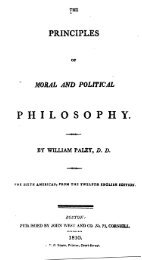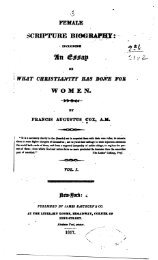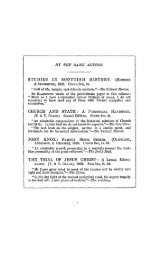BIBLE HISTORY - Classic Works of Apologetics
BIBLE HISTORY - Classic Works of Apologetics
BIBLE HISTORY - Classic Works of Apologetics
Create successful ePaper yourself
Turn your PDF publications into a flip-book with our unique Google optimized e-Paper software.
i<br />
[I<br />
, ,<br />
"<br />
viii<br />
EDITORIAL PREFACE.<br />
Scriptures, with which this history has especially and almost exclusively to do, .their sugges<br />
tions and representations are not out <strong>of</strong> place, and add immeasurably to the interest and<br />
value <strong>of</strong> this volume; but at the same time they ought to be taken with caution and<br />
reserve. Even as these words are being penned, and while the brilliant assaults <strong>of</strong> George<br />
Adam Smith, Cheyne, and Driver, on the unity <strong>of</strong> "Isaiah," are still fresh in the public<br />
mind, Principal Douglas, their peer in learning and ability, is challenging their conclusions<br />
in a masterful treatise, entitled" Isaiah One and His Book One." It is consequently impossible<br />
at this date to anticipate the final findings <strong>of</strong> genuine and well-balanced criticism.<br />
That must be left to the future. Each author connected with this Bible History is alone<br />
responsible for the views he advocates; but whatever these personal teachings may be, every<br />
candid student WIll admit that they have not obscured the sublime truths, which the move<br />
ments <strong>of</strong> the mighty past disclose, that God is in all history, and that all the ages have<br />
providentially been made tributary to his unique manifestation in the Divine Christ.<br />
From the slow development <strong>of</strong> religion, which is perhaps the most notable feature <strong>of</strong><br />
the inspired chronicle, it is evident that we cannot hope to comprehend its meaning 111<br />
a moment or without patient application. God does not hasten: we cannot. It is also<br />
observable, that not only has religion been <strong>of</strong> tardy growth; it has been the product <strong>of</strong><br />
various and <strong>of</strong>tentimes <strong>of</strong> indirect agencies. At the beginning God did not put coal in the<br />
mine, neither did he plant the full-grown tree, but scattered living germs on the earth,<br />
which afterward became forests. These forests drank in the sun until they were soaked with<br />
flame; then they sank into the darkness to be transmuted in the laboratory <strong>of</strong> nature into<br />
substance for heat and light. Thus the final religion had to pass through successive stages.<br />
At first it was but a seed; then it took shape in antediluvian, postdiluvian, patriarchal,<br />
theocratical, ceremonial, and prophetical eras - more than once being submerged in the<br />
night <strong>of</strong> exile, oppression, and apostasy-at last to blaze forth in all the splendors <strong>of</strong> the<br />
Christian dispensation. No wonder, then, if the history <strong>of</strong> this sublime progress should<br />
reveal the touch <strong>of</strong> many hands, and the interblending <strong>of</strong> diverse materials. It may be<br />
compared to a mosaic in which piece to piece has been joined that a glorious picture <strong>of</strong><br />
heavenly things might be produced. Though the seams and divisions <strong>of</strong> this picture may<br />
not be apparent to all- for the Bible is not fashioned like the Byzantine mosaics, where all<br />
the articulations are palpable and rough, but like those <strong>of</strong> Rome where all the lines are<br />
ground down until they are nearly invisible-they still exist; and when some master-work<br />
man shows them to us and makes clear the various fragments that enter into the composi<br />
tion <strong>of</strong> the whole, let it not be doubted that even this may be true, and the divine origin<br />
<strong>of</strong> the grand old book remain uninvalidated. For one controlling, guiding, unifying mind<br />
must have been operative through all the weary ages to produce out <strong>of</strong> such composite<br />
elements a result so wonderfully unique, upliftjng, and unfathomable as the Bible: and that<br />
mind in the nature <strong>of</strong> things could not have been human.<br />
It has been customary in volumes <strong>of</strong> this character to give an account <strong>of</strong> the four<br />
centuries between the last <strong>of</strong> the Hebrew prophets and the first <strong>of</strong> the Roman emperors,<br />
and to embrace in the narrative a description <strong>of</strong> the overthrow <strong>of</strong> Jerusalem. This introduc<br />
tion <strong>of</strong> material not contained in the Scriptures is justified as necessary to an understanding<br />
<strong>of</strong> the relation existing between the old economy and the new, and to the coherent unfolding<br />
<strong>of</strong> the divine purpose in the calling <strong>of</strong> the Gentiles. But it has always seemed to the editor<br />
that the reason, good and sufficient as it is, for this method, ought to lead the historian<br />
yet farther. Instead <strong>of</strong> arresting his work at the point <strong>of</strong> catastrophe, he ought to carry it<br />
onward to the period <strong>of</strong> victory. That the student may perceive how Christianity emerged<br />
from obscurity to the preeminence it attained under the Cresars; that he may see how it





